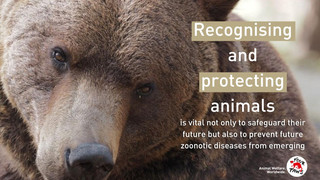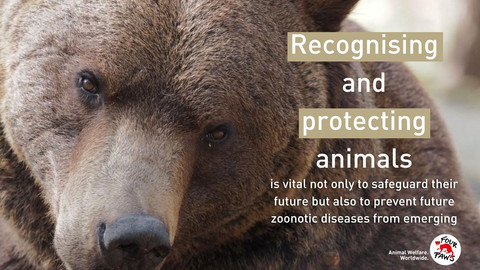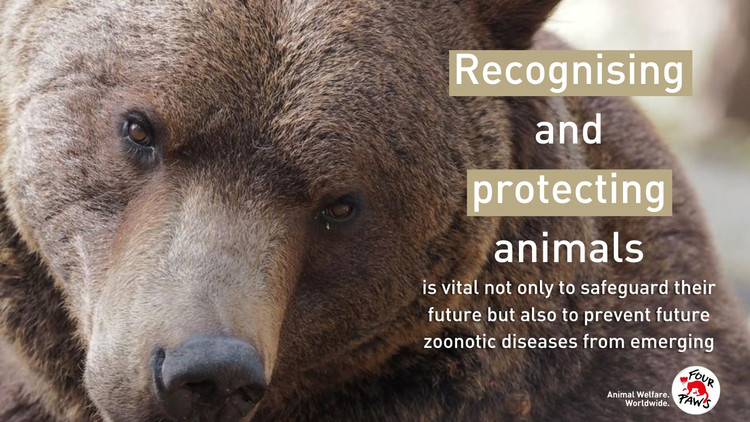
WILL ANIMAL WELFARE FINALLY BE ADDRESSED AT THE UNITED NATIONS ENVIRONMENT ASSEMBLY?
During the Fifth Session of the United Nations Environment Assembly (UNEA 5.2) in Nairobi, animal welfare will finally be given the centre stage it deserves.
This week, final negotiations are taking place on a UNEA resolution on the interconnections between animal welfare, environment and sustainable development.
FOUR PAWS UK is supporting the nexus resolution, which has been tabled by the Government of Ghana along with six other G77 counties, Senegal, Burkina Faso, Ethiopia, Democratic Republic of Congo, South Sudan and Pakistan, and will be on-site to help deliver the best outcome for animal welfare.
The Resolution ‘Animal Welfare – Environment – Sustainable Development Nexus’ calls for the United Nations Environment Programme (UNEP) to prepare a report delving into the connection between animal welfare, the environment and sustainable development.
We are here at UNEA 5.2 in Nairobi, highlighting the resolution’s benefits to member states to ensure it achieves the simple majority vote needed of 97 votes to see its acceptance at a global level.




The Three Interconnected Crises
We are facing an existential threat for nature, animals and humans from the triple environmental crises of biodiversity loss, climate change and pollution.
One of the biggest threats to nature has arisen from the systems of production and consumption that rely on the exploitative use of animals. And it is poor animal welfare standards in these systems that has become a driver of harm to nature and links the three crises.
Moreover, an increasing body of evidence demonstrates that improving animal welfare will produce direct positive benefits for nature and can strengthen our collective efforts to achieve the Sustainable Development Goals (SDGs).
Why now and why at UNEA?
In the wake of COVID-19 the connection between human and animal health and welfare, and that of our planet, has never been clearer.
It has also become increasingly apparent that we must recognise and protect animals. By doing so we cannot only safeguard their future but also help prevent future zoonotic diseases from emerging.
However, to date, dedicated action to protect animals and their welfare has been inadequate. This inaction has had devastating effects for biodiversity loss, climate change, pollution and global public and environmental health. We now have a chance to reset the equilibrium.
The consideration of animal welfare within UNEP’s policy mandate would help to broaden and enrich its science-policy base, leading to better-informed and more effective policymaking. It will also help with the achievement of many SDGs and the prevention of future pandemics.




The UK’s role
Prior to UNEA 5.2 we wrote to the UK Government, asking not only for the UK to support the resolution when it comes before the Assembly at UNEA 5.2 but also to join the existing seven Member States in co-sponsoring it.
The UK delegation have been strong protagonists of the resolution at the OECPR meetings, that have been taking place all week in Nairobi, often helping to steer discussions and speaking up in support by suggesting helpful amendments and language.
We will continue to work with the UK Government to ensure their ongoing support not only for this important resolution, but for the wider integration of animal welfare in to the work of the United Nations.
What does success at UNEA look like?
Whilst the links between animals, humans and the environment are increasingly established, the only way to fully acknowledge their impact is to address them at a global level.
To even have animal welfare on the agenda at UNEA is already a huge achievement for animals and signals progress by UNEP in acknowledging the importance of considering animal welfare when striving to protect our planet and human health.
However, if the resolution at UNEA 5.2 is passed, it will be a monumental turning point that will support UNEP in strengthening an integrated holistic approach that includes protecting animal welfare to achieve the SDGs. In the long term we hope that success at UNEA 5.2 will help underline that animals and their welfare must be considered in all global policy making at the United Nations.

